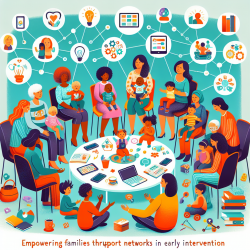Understanding Family Empowerment
Family empowerment is defined as the perception that families have about their skills, self-confidence, and knowledge regarding the care and development of their child with special needs. The study by Martínez-Rico et al. (2022) reveals that family empowerment is not significantly correlated with child-specific factors such as age, diagnosis, or the reason for referral to EI. Instead, it is closely related to the types of support networks utilized by the families.Types of Support Networks
Support networks can be categorized into three types:- Formal Supports: These include EI professionals, pediatricians, teachers, and other specialized medical professionals.
- Informal Supports: These consist of family members, friends, and neighbors.
- Intermediate Supports: These are community-based supports such as parent groups, church members, and social associations.
The study found that families primarily rely on formal supports, followed by informal supports, and to a lesser extent, intermediate supports. Interestingly, families with lower empowerment scores tend to make greater use of formal supports over informal ones.
Practical Implications for Practitioners
To improve family empowerment, practitioners should:- Assess Support Networks: From the first encounter, professionals should assess the type and level of support each family has. This can be done through tools like the Family Support Scale.
- Promote Informal Supports: Encourage families to leverage their informal support networks, such as extended family and friends, as these have been shown to significantly impact empowerment levels.
- Facilitate Intermediate Supports: Create opportunities for families to connect with community-based supports. This can include organizing parent groups or connecting families with local social associations.
- Collaborative Relationships: Foster collaborative relationships between families and professionals. Positive interactions with formal supports can enhance family quality of life and empowerment.
Encouraging Further Research
The study highlights the need for more research into the cultural differences in support networks and their impact on family empowerment. Practitioners are encouraged to explore these variables further to tailor interventions more effectively.In conclusion, understanding and enhancing support networks can significantly impact family empowerment in early intervention. Practitioners should focus on assessing and promoting diverse support networks to foster better outcomes for both children and their families.
To read the original research paper, please follow this link: Support Networks and Family Empowerment in Early Intervention.










